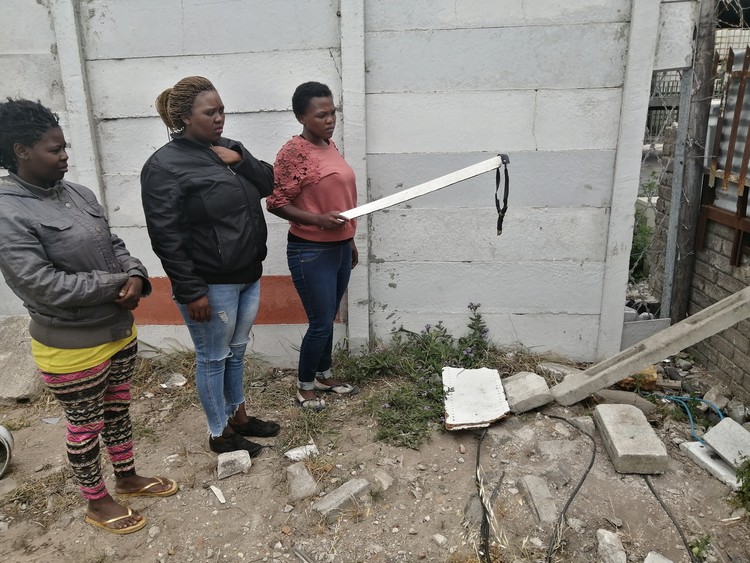
Amanda Scheepers holds a sling her son Siyabonga was using when he was was electrocuted. She is flanked by her cousins Phumeza Rala and Vuyokazi Rala. Photo: Mkhuseli Sizani
10 December 2019
The residents of G-West informal settlement in Walmer township in Port Elizabeth blame the Nelson Mandela Bay Municipality for the death of nine-year-old Siyabonga Scheepers. He was electrocuted by izinyoka, an illegal electricity connection, while playing with friends.
Siyabonga was apparently shooting birds with a sling with his friends when he stood barefoot on an illegal electrical line. Siyabonga’s aunt Vuyokazi Rala tried to rescue him, but got a shock in the process.
Rala said on Saturday afternoon her eight-year-old son came running home. “He told me and my grandmother that my nephew was dying on izinyoka lines.”
Rala ran with a neighbour to the scene. There they found Siyabonga with his bare feet stuck to an illegal line running from a substation. “I asked him to come to me but he could not move,” Rala said. “I managed to remove him from the line but I also got shocked on my feet. But our neighbour rescued me. An ambulance was called but on its arrival my nephew was declared dead.”
The reason residents blame the municipality is that it has not yet repaired a transformer that was damaged three months ago. The child’s mother, Amanda Scheepers, said: “My son would still be alive if the municipality had fixed our electricity problems. We have electricity at home but it is not working.”
She said that because residents are frustrated by not having electricity, they have made illegal connections, and that’s what killed Siyabonga. “Other kids thought that he was playing when he got stuck on those lines. They only realised when he could not move and speak.”
“On Monday morning I picked up his sling and other kids were still walking barefoot and playing where my son died. More kids will die as long we don’t have electricity in our homes,” Scheepers said.
Phumzile Rala, deputy chairperson of G-West Area Committee (and a relative of Vuyokazi Rala) blamed shoddy work. “We have not had electricity in our houses for nearly four months because the municipality employed people who know nothing about electricity.”
“Many houses can’t switch on their electricity because the electricity was done by incompetent people. All their complaints were reported to me and I took them to the office of the ward councillor. But after no solutions to their problems they stopped reporting them and resorted to izinyoka connections,” said Rala. “Everybody here hates izinyoka connections. That is why we have held several protests for proper electricity. Izinyoka connections are dangerous and damage our electric appliances.”
“We need proper electricity done by professionals,” he said.
Not everyone agrees. Ward 4 councillor Ayanda Tyokwana said there are a few shacks experiencing electrical problems. “But there are those whose electricity is working just fine but are continuing with izinyoka connections to avoid paying for electricity. That is unacceptable and needs to be stopped.”
Tyokwana said this is the third person to be electrocuted since he became a councillor in 2016.
“The municipality introduced this programme of shack electrification to stop izinyoka connections and prevent these unnecessary deaths.” The councillor said that over 1,000 shacks in the neighbourhood have had electricity installed.
Municipal spokesman Mthubanzi Mniki said that the City was aware of the electricity problems in Walmer, most of which, he said, were caused by illegal electricity connections.
“The transformer will be replaced but as long as some people choose not to pay for electricity but rather connect illegally, the problems of blowing up of transformers will continue. We are making a plea to residents to not connect illegally,” said Mniki.